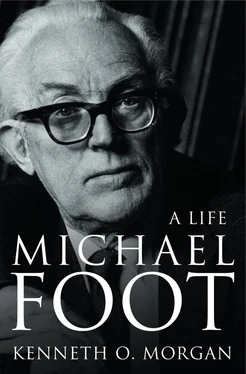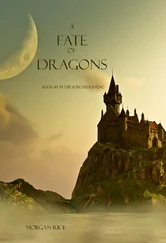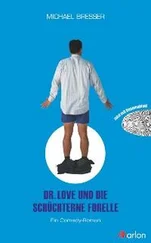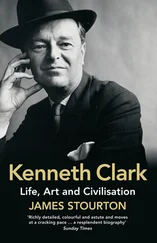Foot’s passion for India provided an important context for his socialism. He remained on good terms with the notoriously prickly Krishna Menon after Nehru appointed him High Commissioner in London in 1947. There were also continuing links with people like Karaka, editor of a famous weekly, Current , a great admirer of Gandhi in his last period but a critic of Nehru. 14 Foot continued to enjoy fame in India as a man sympathetic to the country even at the time of difficulties with Pakistan in the 1960s, and with close access to Mrs Gandhi during some important visits to the subcontinent in the 1970s. On the long-running dispute with Pakistan over Kashmir, and the 1975 State of Emergency, Foot always resolutely took the Indian side, even at the cost of much flak from close friends like the journalist James Cameron and his Indian wife Moni. He encouraged Sheikh Abdullah, the Muslim nationalist leader in Kashmir, to promote the cause of integration into India.
Foot retained close relations with leading Indians. An early one was the author Mulk Raj Anand, ‘India’s Dickens’, a well-known habitué of Bloomsbury in the 1930s and a friend of Virginia Woolf and T. S. Eliot. Foot was especially moved by Anand’s sensitive chronicle of the world of the Untouchables, as indeed was Foot’s friend Indira Gandhi. 15 Another Indian friend and admirer, years later, was the industrialist Swraj Paul, who established a steel mill (opened there by Indira Gandhi) in Foot’s Ebbw Vale constituency after the closure of much of its old steelworks. Yet another was the celebrated Observer cartoonist ‘Abu’ (Abu Abraham), a kind of Indian version of Foot’s friend ‘Vicky’. 16 Foot’s later visits to India between 1973 and 1997 were of central importance for him, not only for Indian matters but also in pursuing the cause of world disarmament. He rejoiced in the Congress’s return to power in 2004, since the new Prime Minister, the Sikh Manmohan Singh, was an old personal friend.
India thus provided an important early dimension of Foot’s socialism, even if he was always inclined to exaggerate the degree to which the post-Menon Congress really had a socialist philosophy. It made him close to socialist authors like Brailsford, Wells and Laski, all much engaged in the affairs of the subcontinent. At the same time Cripps, himself highly knowledgeable about India, became more distant from the Congress as time went on, and the controversial episode of his disastrously ambiguous ‘offer’ of dominion status in 1942 led to a serious breach with Nehru. India, then, intensified Foot’s socialism. But it also proved to be a major factor for him in questioning Cripps’s political judgement, and they quarrelled again, as they had done over the Unity campaign with the Communists in the late thirties. India thus partly led Foot to measure his distance from the man who had been his major inspiration in making him a socialist in the first place. It should also be added that Foot’s deep political interest in India never extended to a serious concern with problems of trade, aid or development in Third World countries. In this, as in other respects, his lack of interest in economic questions limited his curiosity about matters that stimulated his socialist conscience on other grounds.
Palestine was the other country to attract his attention as a newborn socialist. Ever since his visit to see Hugh there in 1934, he had been deeply absorbed by the country. He had by now met Jewish friends like Sydney Silverman in the Labour movement, while the Labour Party considered itself to have important bonds with Jewish Labour figures in Palestine like David Ben-Gurion and Golda Meir. Indeed, there was a small Jewish movement in Britain, Poale Zion, that was affiliated to the Labour Party. Michael’s visit to see Hugh ‘Mac’ in 1934 inspired his intuitive concern, but also a sense of the complexities of the region. An instinctive attachment to Zionism was challenged by a sense of the Arab desperation which broke into open rebellion in the later 1930s. Hugh Foot himself took the strongly pro-Arab line dominant in the Foreign and Colonial Service. In the 1960s, at the UN and in Harold Wilson’s government, he was passionately pro-Palestinian. In 1967 he largely drafted UN Resolution 242, which for the first time attempted to check perceived Israeli aggressive incursions and settlements over the West Bank of the Jordan. Most of the other Foots tended to gravitate to this line also. When Hugh died in 1990, remarkably enough, Palestinian Arab flags were draped over his coffin, at the request of his son Paul. 17 But in this, as in other ways, Michael was a dissenter within his dissenting family.
By the time war was under way, his support for the Jews was a pivot of his political outlook. It became even more pronounced after the war when he, Richard Crossman, Ian Mikardo and others on the left became passionate critics of Foreign Secretary Ernest Bevin’s strongly pro-Arab policy. There were important personal factors in shaping Michael’s views: friends in the party like Teddy Kollek, later Mayor of Jerusalem and both friend and foe of Arthur Koestler; and certainly his fondness for Lily Ernst, the Jewish Yugoslav girlfriend/mistress of Lord Beaverbrook. In the war years he met Arthur Koestler, the most ardent of Zionists, who went as far as endorsing the attacks of the terrorist Stern gang on British troops. Foot’s newspaper Tribune was to employ influential Jewish, and strongly pro-Israel, contributors like Jon Kimche, Evelyn Anderson and its literary editor, Tosco Fyvel. But obviously the dominant element was the torment of the Jewish people under the Nazi regime, even if the dimensions of the Holocaust were not yet widely known. It made Michael Foot a strong champion of a partitioned Palestine with recognition of a Jewish state of Israel. Only much later, in the 1970s, following, among other things, fierce debate on the Palestine issue amongst the Tribune group of MPs, did he come to modify an old entrenched position, and to join others on the left to call for an Israeli withdrawal from settlements on the West Bank. The Jews, he felt, ‘had wrecked their own case’. 18 In any case, a sternly nationalist Likud-led administration seemed far removed from the old comradeship in the era of Ben-Gurion and the socialism of the kibbutz.
Otherwise the new-born socialist followed the standard position of the Liberal-Labour left, endorsing European regimes such as the Popular Front governments of France and Spain in 1936, condemning terrorist dictatorship in Germany and Italy (especially the latter, in the case of one who had many Italian friends and who revered the works of the socialist novelist Ignazio Silone). Towards the League of Nations Foot’s view was a characteristic confusion of pacifism with pacificism, collective security being bracketed with the ending of all wars. After all, the Soviet Union itself was now a member of Cripps’s ‘burglars’ union’ (as he had once called the League of Nations). Only some on the Labour left began to recognize the emptiness of their diagnosis, individual MPs like Hugh Dalton and especially the TUC, concerned for the fate of trade union comrades under Hitler and Mussolini.
One country, however, was never close to Michael Foot’s world view – the Soviet Union. His growing interest in the Marxist interpretation of history never translated into sympathy for Russia under Stalin. He did not share the simple-minded certainties of contemporary young Cambridge intellectuals like Blunt, Burgess and Maclean. It is utterly ironic that in the 1990s disaffected and unreliable informants of MI 5 such as Oleg Gordievsky began to spread rumours that Foot (or ‘Agent Boot’) had been a Soviet ‘agent of influence’. right-wingers in the security service who had let genuine spies such as Kim Philby slip through the net actually gave them some credence. On the contrary, Foot rejected with scorn the totally uncritical enthusiasm for Russia shown by the Webbs or Bernard Shaw. He praised H. G. Wells for having a famous dialogue with Stalin in 1934 but in no way being taken in by him. It was a cause of a breach with Cripps that his old icon proved so undiscriminating in his allies in the Unity Front, seeking common cause with the Communists in the later thirties. Foot was quick to respond to news of Stalin’s purges in 1937–38; least of all those on the democratic socialist left could he be accused of fellow-travelling. The simple-minded journalistic claims at the time of l’affaire Blunt that all intelligent young people inevitably migrated towards Communism as the strongest resistance to fascism in the thirties have little substance. A broad-church Labour Party was the invariable destination of almost all of them, even in the pro-Russia climate of the later stages of the war. Like most of his fellow Bevanites and Tribunites, Michael Foot was a redoubtable voice of anti-Communism. Nor did he ever accord to the Russian Revolution of 1917 the special place in his historical affections that was claimed by the events in France in 1789.
Читать дальше












